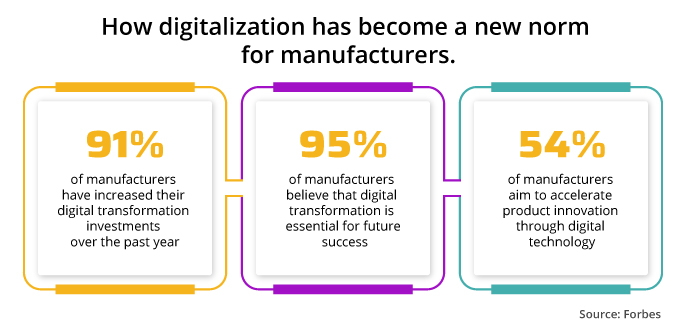The past two years have been a roller coaster ride for most industries. We have witnessed challenged supply chains, scrambled logistics networks, global health crises, unemployment, and much more.
Although we have entered into the new normal, the pandemic has brought several operational challenges to the manufacturing industry (State of Manufacturing report, Fictiv 2021). After experiencing difficult circumstances due to rising material costs, product management complexity, and declining productivity, most industrial manufacturers have implemented the latest technologies like IoT, Big Data analytics, automation, cloud ERP, and predictive maintenance to stay competitive. Learn how to get ready for manufacturing industry trends in 2023.

Industrial machinery manufacturing involves the production of heavy industrial equipment and custom-engineered goods across various industries. Since many project requirements are unique, processes change frequently. Industrial manufacturing production can be very challenging to manage.
Now is the time to look for a solution that can provide a digital transformation to help overcome business challenges. Let’s explore how ERP helps solve the many difficulties industrial machinery manufacturers face.
6 Difficulties Faced by Industrial Machinery Manufacturers: How ERP Can Solve Them
1. Engineering Challenges
Due to unique project specifications, industrial machinery (IM) manufacturers’ production is complex. Whether for an initial machinery order, or changes to an existing product, translating project requirements into production workflow is time-consuming and challenging. Having technology that can help to streamline processes saves valuable time. Manufacturing ERP lets engineers create a Bill of Materials (BOM) to record the items and instructions required for production. Manufacturing ERP accesses the BOM within the system to quickly prepare for production. It saves time and eliminates manual errors. It also allows the engineering department to focus more on designing and engineering tasks.
2. Production and Planning Hiccups
As with every industry, machinery and equipment manufacturers need to determine project timelines. Many companies use the critical path method to find the most efficient production workflow and compare the given timeline with the actual progress to identify bottlenecks. The critical path method identifies all the tasks needed to complete the project, then determines the tasks that must be done on time, those that can be delayed if needed, and how much float or slack is available. But this method is unable to address potential changes to resources such as interruptions, escalations, and absences. With an integrated manufacturing ERP, industrial machine manufacturers can check jobs in progress, jobs yet to begin, or jobs completed with visibility to shop floor performance. ERP’s integrated scheduling coordinates the start and stops times for all job operations. Learn how advanced planning and scheduling help manufacturers streamline production.
3. Managing Demand, Inventory, and the Supply Chain
Manufacturing companies often deal with complex supply chains. Industrial machinery manufacturers have challenges with their supply chain due to many custom orders. It is difficult to manage inventory since it is hard to forecast demand. An integrated manufacturing ERP enables industrial machinery manufacturers to track and manage inventory in real time, avoid material shortages, optimize the supply chain, and meet delivery dates.
4. Quotation Management
Frequent quotation errors are one of the biggest challenges faced by industrial machinery manufacturers. IM manufacturers look for ways to reduce errors, time, and costs of calculating quotations. The best way to improve the quotation process is to leverage an automated solution for providing a timely response to quotation requests with accurate data. ERP helps industrial machinery & equipment manufacturing companies track and respond to Request for Quotations (RFQs) from a centralized dashboard. It enables IM manufacturers to build accurate quotes based on real-time visibility of material and labor costs, vendor processes, inventory, Bill of Materials (BOM), profit margins, and resource availability. These quotations can be sent to customers and if approved, quickly converted into sales orders.
5. Resource Management
Manufacturing companies always want to optimally use their resources. But for that to happen it’s critical to have effective planning and scheduling. Resource management is one of the major challenges faced by industrial machine manufacturers. They need to coordinate resources (materials, people, and machines) with the project and deal with interruptions, absences, breakdowns, and escalations. An integrated manufacturing ERP solution stores important information about machinery, materials, production staff, and other key resources. Manufacturing ERP can connect to production machinery using sensors to receive alerts for machine issues and preventive maintenance. IM manufacturers can get reports in real-time to check machine capacity, equipment efficiency, and staff performance to ensure resources are used effectively. If there are any issues, corrective actions can be taken.
6. Service Flow Problems
IM manufacturing projects don’t end when the equipment is finished production. Most customers will require service for the products purchased. Industrial machinery manufacturing companies need service management functionality to manage service tickets and view past orders, service status, service history, warranty details, etc. Service personnel can schedule service requests and visits on a shared calendar, and tickets can be assigned to service personnel based on experience, availability, and priority. The modern ERP system also ensures on-the-go service support by providing instant access via smartphones and handheld tablets.
Wrap Up
In this dynamic business landscape and rising global competition, challenges for industrial machine manufacturers will increase in 2023. A modern ERP system can help address these challenges by providing greater collaboration, security, reporting, forecasting, planning, and compliance. Learn more about manufacturing ERP and how it can help your business.
Follow Us










